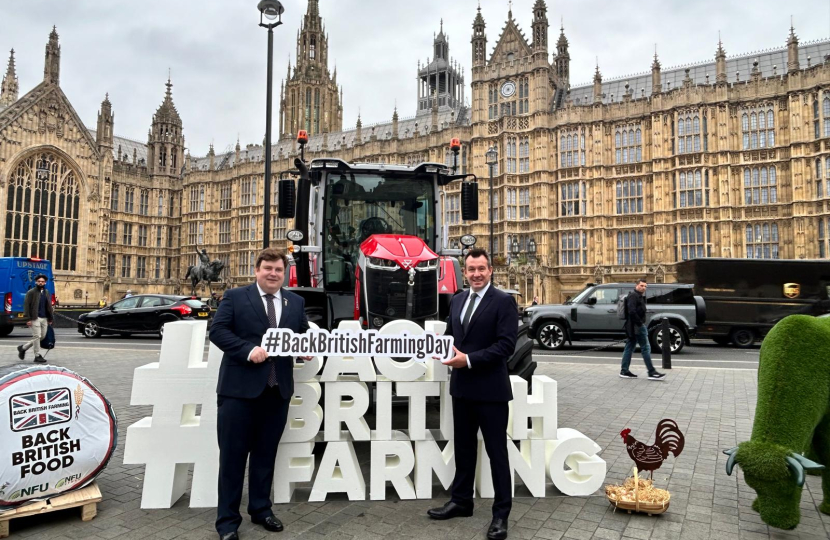
Stuart Anderson MP supports Back British Farming Day
Stuart Anderson MP has launched a new campaign to protect support for farming families across South Shropshire. He has called on the Chancellor not to remove Agricultural Property Relief (APR) or Business Property Relief (BPR) when she delivers her first budget on 30th October 2024, after residents told him how they provide a vital lifeline to mulit-generational family businesses. APR enables landowners to pass land or pasture that is used to grow crops or to rear animals to future generations for free, while BPR fulfils the same objective for other types of rural businesses.
Yet, the Chancellor of the Exchequer is on record as having said she will examine “every single tax break” that taxpayers can apply for. Stuart has said that any changes to reliefs would be a "severe blow" to farming families and other rural businesses at a time when the government instead should be supporting them. Reports the reliefs may be scrapped have been met with apprehension by the sector, which is worried about its impact on food security. So Stuart has called on the Chancellor to rule out any changes to both Agricultural Property Relief (APR) and Business Property Relief (BPR).
The call has been launched on Back British Farming Day, as part of which Stuart attended a Reception held in Parliament hosted by the National Farmer’s Union to hear about the needs of the sector. Stuart’s campaign to keep the tax reliefs comes as research demonstrates removing APR would result in the average UK farm facing an inheritance tax bill of £600,000. Stuart said it could lead to the closure of many family farms and threaten national food security.
Shropshire has a higher number of farm holdings than any other county in the country, with farming and agriculture forming nearly 20% of enterprises in Shropshire. The tax reliefs ensure that family businesses have the confidence to make long-term decisions, so the next generation can carry on producing food and delivering environmental benefits after the death of a farmer. Without it, it is highly likely that farms would need to be split up and sold. In a recent poll conducted by the Country Land and Business Association (CLA), 86% of respondents said that they expected some or all of their land to be sold upon their death. Over 90% said they believed that it would harm food security.
Reflecting the strength of its commitment to helping family farmers, the previous government had announced in the Spring Budget that the existing scope of Agricultural Property Relief (APR) would be extended from 6 April 2025 to land managed that is under an environmental (ELM) agreement - including the Sustainable Farming Incentive, Countryside Stewardship, Landscape Recovery, and Woodland Creation Offer. This removed a significant barrier to tenant farmers and landlords collaborating to enter schemes by removing the risk that tenants’ participation in schemes would change whether the land is eligible for Agricultural Property Relief (APR). It then included in its manifesto a proposal to protect families from higher taxes with a ‘Family Home Tax Guarantee’, which the new government has not yet adopted.
Stuart has already questioned the new government’s commitment to rural areas including local farming communities. He recently called on the government to double investment available for farmers, boosting the UK-wide agriculture budget by £1 billion and to introduce a legally binding target to enhance food security - as recommended by the National Farmers' Union. He has also urged the government to ringfence agricultural funding, after it emerged that officials are looking at cutting the agricultural budget by at least £100 million a year due to previous unspent funds.
Stuart Anderson MP said:
“Generations of farmers in South Shropshire have kept us nourished and well-fed. On Back British Farming Day, we must show them our support. Yet, the Chancellor has warned that she will examine “every single tax break” that taxpayers can apply for. This has been met with apprehension by the sector, who are worried that this means Agricultural Property Relief (APR) and Business Property Relief (BPR) may be abolished. Residents have told me these reliefs provide a lifeline to multi-generational family businesses like theirs. Without them, both food security and the local economy would be severely harmed. So, I have urged the Chancellor to rule out any changes to these tax reliefs. If the Chancellor scraps them, it would be a huge blow to small rural businesses and farmers at a vital time when government should be supporting them.”




